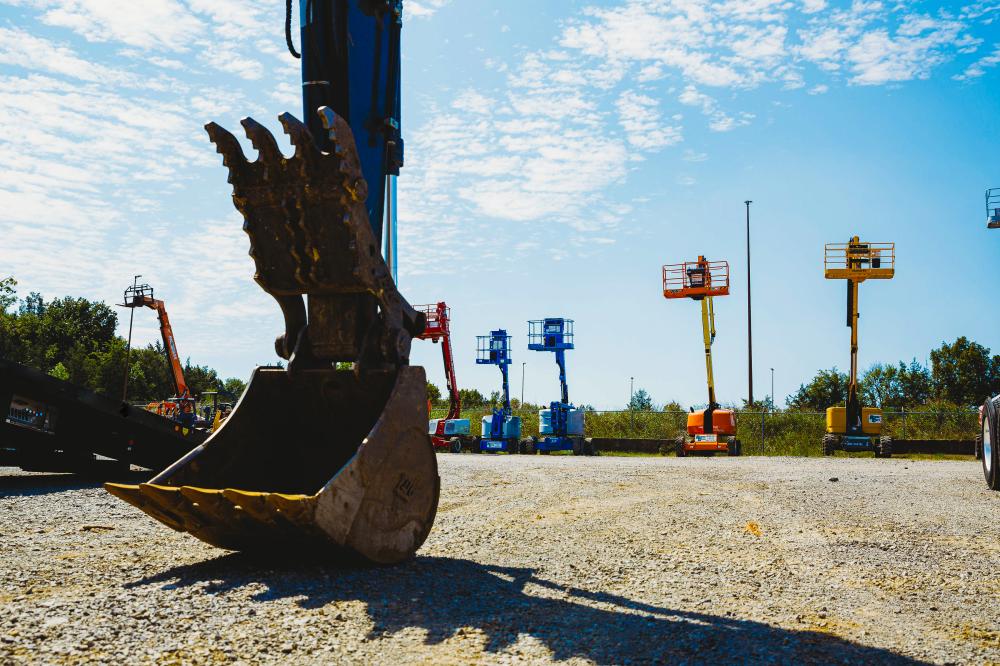Need Heavy Equipment Rental? Select Our Mini Excavator Rental and Boom Lift Rental Choices
Need Heavy Equipment Rental? Select Our Mini Excavator Rental and Boom Lift Rental Choices
Blog Article
Essential Tips for Taking Care Of Heavy Tools Rental Agreements and Logistics Efficiently
Properly handling hefty equipment rental arrangements and logistics is critical for the success of any type of job that counts on these resources. A complete understanding of rental terms, combined with precise assessment of equipment needs, lays the foundation for beneficial settlements.
Understand Rental Terms
Recognizing rental terms is necessary for effective hefty devices monitoring. The rental period defines the duration for which the tools is leased, affecting budgeting and job timelines.
Furthermore, it is important to understand the maintenance obligations outlined in the contract. Typically, rental companies keep the devices, however recognizing who is responsible for routine checks and repair services is essential to stop functional interruptions. Furthermore, terms may include conditions worrying obligation for problems or burglary, which can have significant financial ramifications if not properly recognized.

Assess Tools Demands
Assessing devices demands is a crucial action for any type of project manager aiming to enhance source appropriation and improve operational performance. This procedure involves a thorough evaluation of the job requirements, consisting of details jobs, timelines, and the type of tools necessary to attain desired outcomes.
Begin by determining the range of the task and the tasks that will be carried out. Think about aspects such as the terrain, the scale of procedures, and any potential challenges that could influence equipment choice. Engaging with group participants that will certainly run the machinery can offer useful insights into useful needs and choices.

Following, evaluate the capacity and capabilities of readily available equipment alternatives. It is necessary to match the ideal devices to the tasks available, guaranteeing that it can handle the anticipated work without endangering safety and security or performance.
Additionally, consider the rental duration and regularity of usage. Recognizing these components can assist determine whether buying or renting is the most affordable service. By conducting a detailed analysis of tools demands, project supervisors can make enlightened choices that lead to boosted efficiency and decreased operational prices.
Negotiate Successfully
Once the equipment requirements are clearly recognized, the following step includes effective arrangement with rental firms to secure favorable terms. Begin by looking into different rental firms to understand their rates frameworks, inventory availability, and track record.
When approaching the negotiation table, be clear about your demands, consisting of the sort of tools, rental duration, and any type of extra services you may need. This transparency makes it possible for rental companies to offer customized solutions that can fulfill your certain needs (construction equipment rentals). Do not be reluctant to ask for price cuts, particularly for long-term rentals or mass orders, as many firms agree to use concessions to safeguard larger agreements
These variables can substantially impact the total cost and must be clearly outlined in the rental contract. Make sure that all agreed-upon terms are documented in writing to prevent misunderstandings and protect your passions throughout the rental duration.
Coordinate Transport Logistics
Coordinating transportation logistics is a crucial facet of taking care of heavy equipment rental contracts. Efficient transport ensures that devices is delivered promptly and in optimal condition, thus decreasing downtime and boosting task effectiveness. To achieve this, it is necessary to create a thorough logistics prepare that lays out the whole transportation process from pick-up to distribution.
Begin by assessing the certain transportation demands based on the type and dimension of the equipment included - scissor lift rental. Engage with reliable transport carriers who concentrate on hefty tools to guarantee they have the needed experience and equipment, such as flatbed trucks or specialized trailers. Talk about factors such as weight limitations, course limitations, and called for licenses to avoid unexpected hold-ups
In addition, keep open interaction with both the rental firm and the transportation service provider to work with timetables successfully. Confirm all details, including pickup and drop-off times, to guarantee everybody is aligned and prepared. Finally, establish backup plans to resolve any kind of prospective disturbances, such as adverse climate or website traffic problems, which might affect the transport timeline. By diligently coordinating transportation logistics, you can copyright the stability of your rental contract and promote smooth project implementation.
Prepare For Maintenance and Assistance

Moreover, it is essential to connect straight with the rental supplier relating to maintenance responsibilities. Some arrangements may include upkeep as component of the rental solution, while in other cases, the onus may drop on the occupant. Understanding these terms will certainly help stay clear of unforeseen costs and responsibilities.
In enhancement, having accessibility to technological assistance can be important. Guarantee that the rental company supplies 24/7 assistance or an emergency get in touch with, permitting quick resolution of any type of mobile heavy machinery tools concerns. Training your team on appropriate equipment use and regular checks can additionally substantially improve functional efficiency.
Conclusion
In final thought, effective management of heavy equipment rental arrangements and logistics hinges on a comprehensive understanding of rental browse around these guys terms, specific evaluation of tools needs, and skilled settlement abilities. Emphasizing clear interaction with all stakeholders remains essential in navigating the intricacies of tools leasing and logistics monitoring.
Successfully taking care of hefty tools rental arrangements and logistics is crucial for the success of any type of task that counts on these sources. By thoroughly evaluating and recognizing these rental terms, businesses can make educated choices, reduce dangers, and ensure that their heavy tools monitoring aligns with project objectives and monetary restrictions.Working with transport logistics is a crucial facet of handling heavy tools rental agreements.In conclusion, reliable management of heavy devices rental arrangements and logistics joints on a comprehensive understanding of rental terms, precise evaluation of devices requirements, and adept arrangement skills. Highlighting clear communication with all stakeholders continues to be important in navigating the intricacies of equipment service and discover this logistics administration.
Report this page